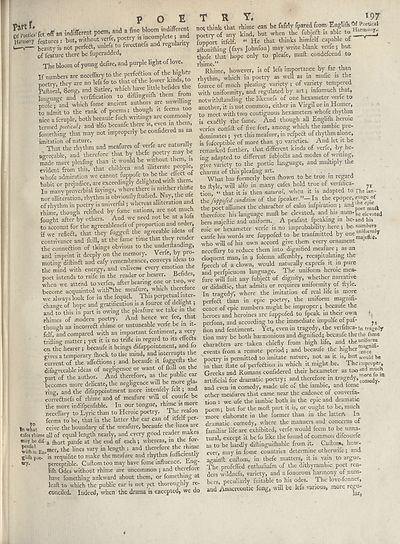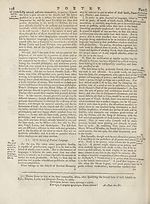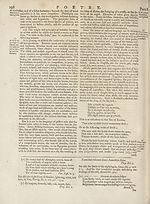Encyclopaedia Britannica > Volume 15, PLA-RAM
(235) Page 197
Download files
Complete book:
Individual page:
Thumbnail gallery: Grid view | List view

. POE
* • *!r * an indi’^ercnt poem, and a fine bloom indifferent
pf poetica fet on * t crfe poetry is incomplete ; and
Hif-mony features: but, without verie, poeiry is * t .
beauty is not perfea, unlefs to fweetnefs and regularity
of feature there be fuperadded,
The bloom of young defire, and purple light of love.
If numbers are neceffary to the perfeftion of the higher
poetry they are no lefsfo to that of the lower kinds, to
Paftoral, Song, and Satire, which have little behdes the
language and^ verfification to diffinguiih them from
profe; and which fome ancient authors are unwilling
to admit to the rank of poems: though it feems too
nice a fcruple, both becaufe fuch writings are commonly
termed poftical; and alfo becaufe there is, even m them,
fomething that may not improperly beconhdered as an
imitation of nature* . **
That the rhythm and meafures of verfe are natural y
agreeable, and' therefore that by thefe poetry may be
made more pleafing than it would be without them, is
evident from this, that children and illiterate people,
vvhofe admiration we cannot fuppofe to be the effea of
habit or prejudice, are exceedingly delighted with them.
In many proverbial fayings, where there is neither rbuhe
tior alliteration, rhythm is obvioufly ftudied. Nay, the u
of rhythm in poetry is univerfal; whereas alliteration and
rhime, though relifhed by fome nations, are not much
fought after by others. And we need not be at alofs
to account for the agreeablenefs of proportion and order,
if we refled, that they fugged the agreeable ideas of
contrivance and (kill, at the fame time that they render
the connedion of things obvious to the undemanding,
and imprint it deeply on the memory. Verle, by pro-
moting diftind and eafy remembrance, conveys ideas to
the mind with energy, and enlivens every emotion the
poet intends to raife in the reader or hearer. Belides,
when we. attend toverfes, after hearing one or two, we
become acquainted with'the meafure, wh,ch therefore
we always look for in the fequel. This perpetual inter-
change of hope and gratification is a fource of delight ;
and to this in part is owing the pleafure we take in the
rhimes of modern poetry. And hence we fee, that
though an incorred rhime or untuneable verfe be in it-
felf, and compared with an important fentiment, a very
trifling matter; yet it is no trifle in regard to its efteds
on the hearer ; becaufe it brings difappomtment, and io
gives a temporary (hock to the mind, and interrupts the
current of the affedions; and becaufe it fuggefts the
difagreeable ideas of negligence or want of floll on the
part of the author. And therefore, as the public ear
becomes more delicate, the negligence will be more gla-
ring, and the difappointment more intenfely felt; and
corrednefs of rhime and of meafure will of courfe be
the more indifpenfable. In our tongue, rhime is more
neceffary to Lyric than to Heroic poetry. The reaion
feems to be, that in the latter the ear can of itfelf per-
ln what ceive the boundary of the meafure, becaufe the lines aie
tafes rhime all of equal length nearly, and every good reader makes
may be dif- a fti0rt panfe at the end of each ; whereas, in the ior-
Skhil En mer> the lines vary kngth : and therefore the rhime
glifh poe* * is requifite to make the meafure and rhythm fufficiently
perceptible. Cuftom too may have fome influence. Lng-
lifli Odes without rhime are uncommon ; and therefore
have fomething aukward about them, or fomething at
leaft to which the public ear is not yet thoroughly re¬
conciled. Indeed, when the drama is excepted, we do
T R Y. x97
nc* think that rhime can be fafely fpared ^
poetry of any kind, but when the fubjed is able to^
fupport itfelf. “ He that thinks himfelt capable of
aftonifhing (fays Johnfon) may write blank verfe ; but
thofe that hope only to pleafe, muff condeicend to
rhime.” i r i
Rhime, however, is of lefs importance by tar than
rhythm, which in poetry as well as in mufic is the
fource of much pleafing variety ; of variety tempered
with uniformity, and regulated by art; infomuch that,
notwithstanding the likenefs of one hexameter verfe to
another, it is not common, either in Virgil or in Homer,
to meet with two contiguous hexameters whofe rhythm
is exadly the fame. And though all Englifh heroic
verfes confift of five feet, among which the iambic pre¬
dominates ; yet this meafure, in refped of rhythm alone,
is fufceptible of more than 30 varieties. And let it be
remarked further, that different kinds of verfe, by be¬
ing adapted to different fubjeds and modes of writing,
give variety to the poetic language, and multiply the
charms of this pleafing art. , • . ,
What has formerly been fiiown to be true in regard
to ftyle, will alfo in many cafes hold true of verhhea- 7r
tion “ that it is then natural, when it is adapted to The ian-
At fippofid condition of the fpeaker In the epopee, w of
the poet affnmes the character of calm mfp.ratio.1; and ' ^
therefore his language muff be elevated, and his num-|,e ejevat6(j
bers maieftic and uniform. A peafant fpeaking in he-and his
roic or hexameter verfe is no improbability here ; be. n^ers
caufe his words are fuppofed to be tranfmitted by one
who will of his own accord give them every ornament
neceffary to reduce them into dignified meafure; as an
eloquent man, in a folemn affembly, recapitulating the
fpeech of a clown, would naturally exprefs it in pure
and perfpicuous language. The uniform heroic mea¬
fure will fuit any fubjed of dignity, whether narrative
or didadic, that admits or requires uniformity of ftyle.
In tragedy; where the imitation of real life is more
perfed° than in epic poetry, the uniform magnifi¬
cence of epic numbers might be improper ; becaufe the
heroes and heroines are fuppofed to fpeak in their own 1.
perfons, and according to the immediate impulfe of paf- ^
fion and fentiment. Yet, even in tragedy, the verfifica-in tragedy
tion may be both harmonious and dignified; becaufe the the fame
charaders are taken chiefly from high life, and the ^'L’j?
events from a remote period ; and becaufe the * '*ence
poetry is permitted to imitate nature, not as it is, but WOuld be
in that ftate of perfedion in which it might be. The improper,
Greeks and Romans confidered their hexameter as too^uen
try.
U-reeics ana ivonums ~ * more fo in
artificial for dramatic poetry; and therefore in tragedy,
and even in comedy, made ufe of the iambic, and iome
other meafures that came near the cadence of converfa-
tion : we ufe the iambic both in the epic and diamatic
poem; but for the moft part it is, or ought to be, much
more elaborate in the former than in the latteih In
dramatic comedy, where the manners and concerns of
familiar life are exhibited, verfe would feem to be unna¬
tural, except it be fo like the found of common difeourfe
as to’be hardly diftinguifhable from it. Cuftom, how¬
ever, may in fome countries determine otherwife ; and
againft cuftom, in thefe matters, it is vain to argue.
The profeffed enthufiafm of the dithyrambic poet ren¬
ders wildnefs, variety, and a fonorous harmony of num¬
bers, peculiarly fuitable to his odes. The love-fonnet,
and Anacreontic fong, will be lefs various, more regu-
4
* • *!r * an indi’^ercnt poem, and a fine bloom indifferent
pf poetica fet on * t crfe poetry is incomplete ; and
Hif-mony features: but, without verie, poeiry is * t .
beauty is not perfea, unlefs to fweetnefs and regularity
of feature there be fuperadded,
The bloom of young defire, and purple light of love.
If numbers are neceffary to the perfeftion of the higher
poetry they are no lefsfo to that of the lower kinds, to
Paftoral, Song, and Satire, which have little behdes the
language and^ verfification to diffinguiih them from
profe; and which fome ancient authors are unwilling
to admit to the rank of poems: though it feems too
nice a fcruple, both becaufe fuch writings are commonly
termed poftical; and alfo becaufe there is, even m them,
fomething that may not improperly beconhdered as an
imitation of nature* . **
That the rhythm and meafures of verfe are natural y
agreeable, and' therefore that by thefe poetry may be
made more pleafing than it would be without them, is
evident from this, that children and illiterate people,
vvhofe admiration we cannot fuppofe to be the effea of
habit or prejudice, are exceedingly delighted with them.
In many proverbial fayings, where there is neither rbuhe
tior alliteration, rhythm is obvioufly ftudied. Nay, the u
of rhythm in poetry is univerfal; whereas alliteration and
rhime, though relifhed by fome nations, are not much
fought after by others. And we need not be at alofs
to account for the agreeablenefs of proportion and order,
if we refled, that they fugged the agreeable ideas of
contrivance and (kill, at the fame time that they render
the connedion of things obvious to the undemanding,
and imprint it deeply on the memory. Verle, by pro-
moting diftind and eafy remembrance, conveys ideas to
the mind with energy, and enlivens every emotion the
poet intends to raife in the reader or hearer. Belides,
when we. attend toverfes, after hearing one or two, we
become acquainted with'the meafure, wh,ch therefore
we always look for in the fequel. This perpetual inter-
change of hope and gratification is a fource of delight ;
and to this in part is owing the pleafure we take in the
rhimes of modern poetry. And hence we fee, that
though an incorred rhime or untuneable verfe be in it-
felf, and compared with an important fentiment, a very
trifling matter; yet it is no trifle in regard to its efteds
on the hearer ; becaufe it brings difappomtment, and io
gives a temporary (hock to the mind, and interrupts the
current of the affedions; and becaufe it fuggefts the
difagreeable ideas of negligence or want of floll on the
part of the author. And therefore, as the public ear
becomes more delicate, the negligence will be more gla-
ring, and the difappointment more intenfely felt; and
corrednefs of rhime and of meafure will of courfe be
the more indifpenfable. In our tongue, rhime is more
neceffary to Lyric than to Heroic poetry. The reaion
feems to be, that in the latter the ear can of itfelf per-
ln what ceive the boundary of the meafure, becaufe the lines aie
tafes rhime all of equal length nearly, and every good reader makes
may be dif- a fti0rt panfe at the end of each ; whereas, in the ior-
Skhil En mer> the lines vary kngth : and therefore the rhime
glifh poe* * is requifite to make the meafure and rhythm fufficiently
perceptible. Cuftom too may have fome influence. Lng-
lifli Odes without rhime are uncommon ; and therefore
have fomething aukward about them, or fomething at
leaft to which the public ear is not yet thoroughly re¬
conciled. Indeed, when the drama is excepted, we do
T R Y. x97
nc* think that rhime can be fafely fpared ^
poetry of any kind, but when the fubjed is able to^
fupport itfelf. “ He that thinks himfelt capable of
aftonifhing (fays Johnfon) may write blank verfe ; but
thofe that hope only to pleafe, muff condeicend to
rhime.” i r i
Rhime, however, is of lefs importance by tar than
rhythm, which in poetry as well as in mufic is the
fource of much pleafing variety ; of variety tempered
with uniformity, and regulated by art; infomuch that,
notwithstanding the likenefs of one hexameter verfe to
another, it is not common, either in Virgil or in Homer,
to meet with two contiguous hexameters whofe rhythm
is exadly the fame. And though all Englifh heroic
verfes confift of five feet, among which the iambic pre¬
dominates ; yet this meafure, in refped of rhythm alone,
is fufceptible of more than 30 varieties. And let it be
remarked further, that different kinds of verfe, by be¬
ing adapted to different fubjeds and modes of writing,
give variety to the poetic language, and multiply the
charms of this pleafing art. , • . ,
What has formerly been fiiown to be true in regard
to ftyle, will alfo in many cafes hold true of verhhea- 7r
tion “ that it is then natural, when it is adapted to The ian-
At fippofid condition of the fpeaker In the epopee, w of
the poet affnmes the character of calm mfp.ratio.1; and ' ^
therefore his language muff be elevated, and his num-|,e ejevat6(j
bers maieftic and uniform. A peafant fpeaking in he-and his
roic or hexameter verfe is no improbability here ; be. n^ers
caufe his words are fuppofed to be tranfmitted by one
who will of his own accord give them every ornament
neceffary to reduce them into dignified meafure; as an
eloquent man, in a folemn affembly, recapitulating the
fpeech of a clown, would naturally exprefs it in pure
and perfpicuous language. The uniform heroic mea¬
fure will fuit any fubjed of dignity, whether narrative
or didadic, that admits or requires uniformity of ftyle.
In tragedy; where the imitation of real life is more
perfed° than in epic poetry, the uniform magnifi¬
cence of epic numbers might be improper ; becaufe the
heroes and heroines are fuppofed to fpeak in their own 1.
perfons, and according to the immediate impulfe of paf- ^
fion and fentiment. Yet, even in tragedy, the verfifica-in tragedy
tion may be both harmonious and dignified; becaufe the the fame
charaders are taken chiefly from high life, and the ^'L’j?
events from a remote period ; and becaufe the * '*ence
poetry is permitted to imitate nature, not as it is, but WOuld be
in that ftate of perfedion in which it might be. The improper,
Greeks and Romans confidered their hexameter as too^uen
try.
U-reeics ana ivonums ~ * more fo in
artificial for dramatic poetry; and therefore in tragedy,
and even in comedy, made ufe of the iambic, and iome
other meafures that came near the cadence of converfa-
tion : we ufe the iambic both in the epic and diamatic
poem; but for the moft part it is, or ought to be, much
more elaborate in the former than in the latteih In
dramatic comedy, where the manners and concerns of
familiar life are exhibited, verfe would feem to be unna¬
tural, except it be fo like the found of common difeourfe
as to’be hardly diftinguifhable from it. Cuftom, how¬
ever, may in fome countries determine otherwife ; and
againft cuftom, in thefe matters, it is vain to argue.
The profeffed enthufiafm of the dithyrambic poet ren¬
ders wildnefs, variety, and a fonorous harmony of num¬
bers, peculiarly fuitable to his odes. The love-fonnet,
and Anacreontic fong, will be lefs various, more regu-
4
Set display mode to:
![]() Universal Viewer |
Universal Viewer | ![]() Mirador |
Large image | Transcription
Mirador |
Large image | Transcription
Images and transcriptions on this page, including medium image downloads, may be used under the Creative Commons Attribution 4.0 International Licence unless otherwise stated. ![]()
| Encyclopaedia Britannica > Encyclopaedia Britannica > Volume 15, PLA-RAM > (235) Page 197 |
|---|
| Permanent URL | https://digital.nls.uk/191903831 |
|---|
| Attribution and copyright: |
|
|---|
| Description | Ten editions of 'Encyclopaedia Britannica', issued from 1768-1903, in 231 volumes. Originally issued in 100 weekly parts (3 volumes) between 1768 and 1771 by publishers: Colin Macfarquhar and Andrew Bell (Edinburgh); editor: William Smellie: engraver: Andrew Bell. Expanded editions in the 19th century featured more volumes and contributions from leading experts in their fields. Managed and published in Edinburgh up to the 9th edition (25 volumes, from 1875-1889); the 10th edition (1902-1903) re-issued the 9th edition, with 11 supplementary volumes. |
|---|---|
| Additional NLS resources: |
|

